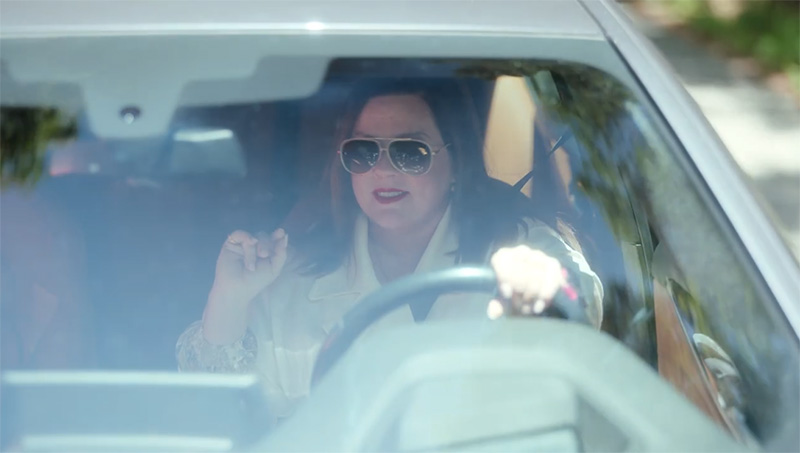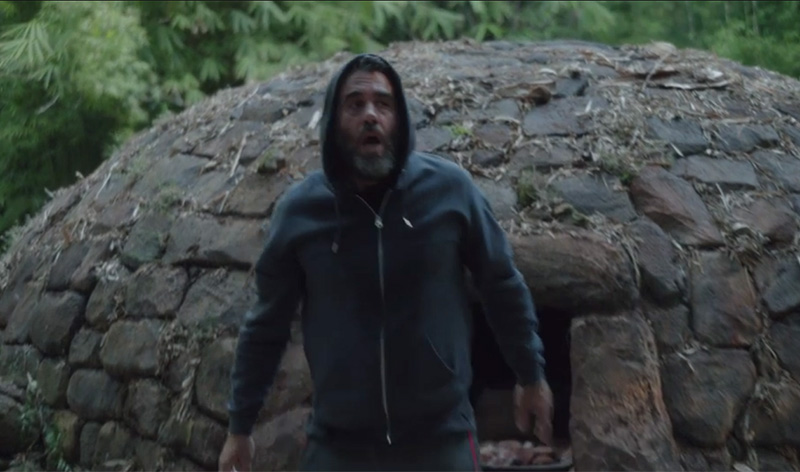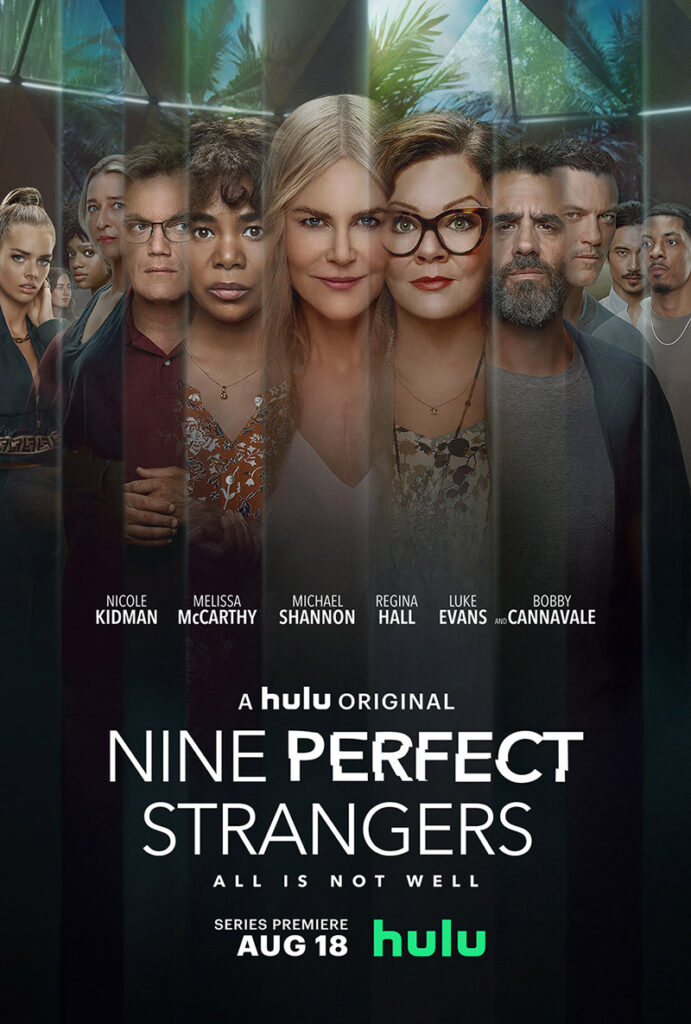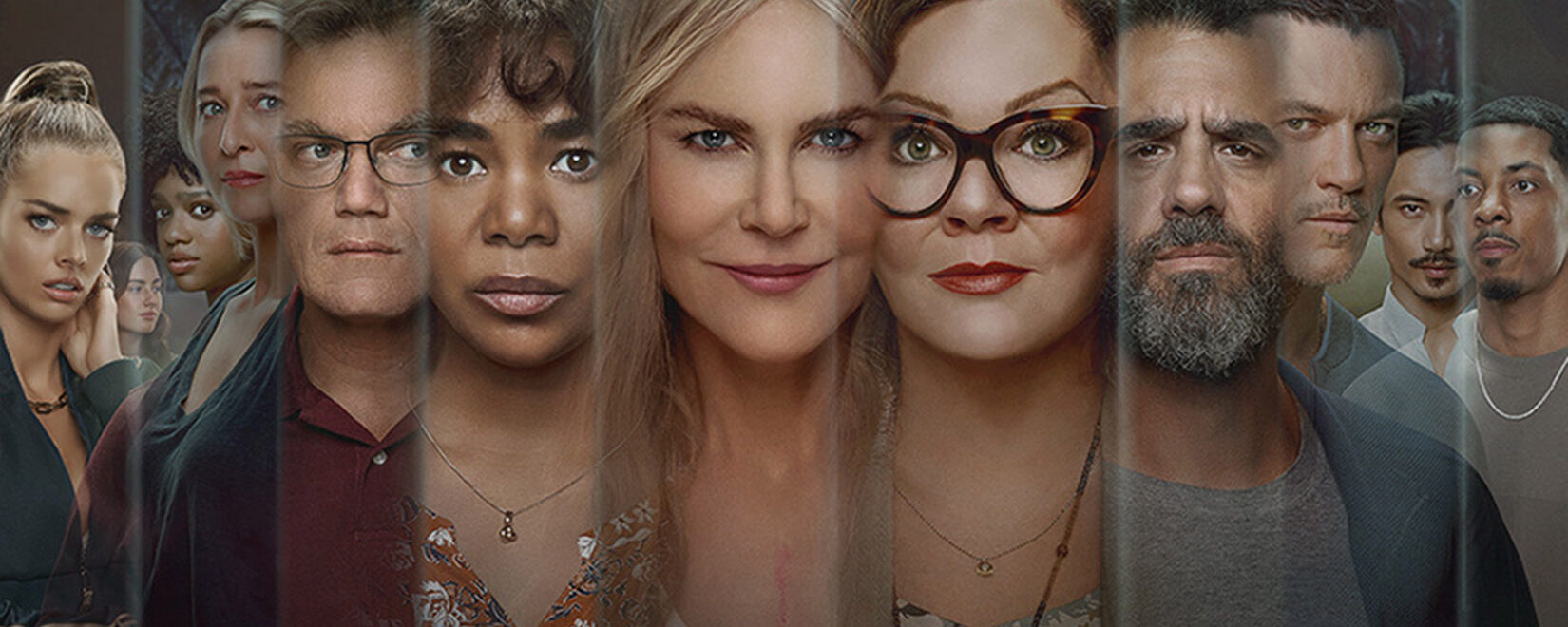Survivor of “that sweat lodge” stands up for survivors of all bad gurus.
From the moment The Algorithm hoisted the trailer for Nine Perfect Strangers into my Youtube feed, I knew I’d watch the show.
The trailer had all the elements to capture my interest: stunning landscape visuals, beautiful architecture, an A list cast, and a bad guru; all courtesy of the team that broke through my early pandemic haze with Big Little Lies.
The night the first three episodes released to Canadians on Amazon, I was vacationing in Vancouver. It was Friday night. I was out for dinner with a friend I’ve known since childhood at a patio overlooking the ocean. My phone was set aside on the table, face down to limit distraction, but I hadn’t silenced my watch. It vibrated on my wrist, drawing my attention to a text notification from another friend at home in Toronto. It was odd. She was three time zones ahead and didn’t usually text me late at night. Turning over my phone, I apologized for the interruption and checked that nothing urgent was going on.
“Hey, just watching the first episode of Nine Perfect Strangers. Big hoopla with Nicole Kidman, Melissa McCarthy, David E. Kelley. First 5 mins in they mention ‘Remember those people in that sweat lodge?’ It stopped me in my tracks and had to message you.”
My heart seized and my gut wrenched. It was a visceral and familiar reaction. I reminded myself to breathe as my heart began to pound in my chest. My throat constricted and my spine tightened into a coil, ready to spring up from the table to fend off an attack. I mustered just one word. I tapped it into my phone, to my friend three thousand miles away.
“Fuckers.”
Because I am one of “those people” in “that sweat lodge.” Except I did not die.
I remember thinking Nine Perfect Strangers would be something I should be familiar with, but felt no urgency when I saw the trailer.
I planned to watch the first three episodes on the plane, or when I returned home. I’m unfamiliar with the story and the book, but my curiosity had been piqued by the cast and subject matter. Nicole Kidman as a bad guru and a flash of a low, domed structure – suggesting a sweat lodge – had caught my eye. Yet here it was, intruding on an idyllic moment in the form of a protective warning from a friend.
Fending off attacks in the form of insults is par for the course as a survivor of the Sedona “sweat lodge”— an ill-fated, culturally appropriated ritual that killed three people at a retreat I attended in October 2009. The thing that triggers my anger is how misunderstood the participants are. Since I am the symbolic survivor, it strikes hard and fast when the attack comes from people and systems with more power and resources than I do. They shape the narrative for their own purposes and who the participants are as a result.
After the trial and sentencing of the “guru,” the news cycle carried on and I became one of the “shaved-headed cult members” who spent so much time fending off judgement and opinions from others that I could hardly get off the couch. I continually had to defend the fact that I was even at such a “freakish” event. To see David E. Kelly and the other creators repeat the same pattern of shame and ridicule of victims with this one single line is the most pejorative and reductive treatment to date.
Instead of dismissing us, someone needs to do a compassionate portrayal of this story because the toxic dynamic of false leaders and the seekers they indoctrinate is alive and well today and it is killing people. As a real survivor, I am someone who has been trying to do that.
When I returned to my hotel room, I poured myself a glass of wine and took a deep breath. It was late, but I knew better than to delude myself that I’d sleep without seeing it. I opened my laptop and logged into Amazon, reassuring myself, “It’s just five minutes in. Remember to breathe.”
I pressed play, inhaling through my nose and exhaling slowly through my mouth as the opening sequence unfolded.
The credits rolled. I took in the big Hollywood names: Nicole Kidman, Melissa McCarthy, David E Kelley. Breathe in, breathe out. Breathe in, breathe out.
The stunning visuals started to pull me in. Breathe in, breathe out. Breathe in, breathe out.
I watched as the main characters were introduced, driving to Tranquillum House, the luxury resort where they will attend a ten-day wellness retreat led by the still unseen guru. Breathe in, breathe out.

Enter Melissa McCarthy as Frances, a novelist in the midst of menopause, heartbreak, and career crisis. Frances is on speaker phone as she drives through a pastoral Australian landscape, packaged to look like California. Frances’ conversation with a friend gives context to her troubles. She wraps up quickly to pick up an incoming call from her agent Marty, hopeful for good news from her publisher about her latest manuscript.
Frances (artificially upbeat): “Hey there, how’s the book biz going today?”
Disembodied Marty (straining): “Whoa, you just sound so upbeat.”
Frances (still faking upbeat): “I’m on my way to that health retreat I told you about. I’m just trying to put myself in a positive state of mind.”
Marty (authoritative, cynical): “Yeah, well, remember those people who died in that sweat lodge? They thought they were being enlightened, and in reality, they were being cooked.”
Frances (justifying): “It’s nothing like that, this place looks amazing.”
The conversation turns to business, and the rejected manuscript. Frances’ downward spiral resumes.
Knowing the line was coming did little to soften its blow. It packed a punch, as it reduced unimaginable pain and near insurmountable grief into just twenty-four words. I played it back a few times, attempting to determine if the intention behind it was as harsh as my friend and I were receiving it.
To be fair, the line is exactly what someone WOULD say to a friend. The question is why are they saying it? To dissuade? To demean? Or out of genuine concern?
Of course, everybody responds “It’s nothing like that” or “I’m not like them” when it’s exactly like that and they are exactly like us.
Once I acclimated with more breathing, I proceeded to watch all three initial episodes. It became a late night – definitely not what I thought I’d be doing. I was drawn into the show, but beyond its entertainment value, I couldn’t help but notice some very real and familiar dynamics that actually happened to me: not sharing the retreat agenda ahead of time, food deprivation, pursuit of altered states, the secretive guru with a past, and believe it or not, a stone sweat lodge.

Other more subtle tactics were also present including manipulation through fear of missing out (FOMO).
When I returned home two days later, “the line” was still bugging me. I went to the novel to see if it was treated the same way as in the script. I seriously needed to know who to be pissed at. Turns out the line is in the novel by Liane Moriarty. The context is slightly different, and there’s one simple yet significant alteration. On the page it reads “Remember those poor people who died in that sweat lodge…” Poor – the only word that might hint at pity, empathy or sympathy – has been removed for the screenplay.
Those people. Those poor people who died. That sweat lodge.
To be a survivor of the Sedona “sweat lodge” is to be minimized, if not overlooked. Survivorship has earned me a place in a weird kind of limbo between life, death, and a plot point in other people’s projects. They use survivors’ desire to share our lived experience for entertainment and profit. While there’s been a documentary movie (Enlighten Us, 2016) and episodic podcast (GURU, 2020), none have centered on the experience of the survivors. Nine Perfect Strangers’ tone deaf and tasteless line is the most reductive treatment to date. For the sake of a convenient piece of foreshadowing, it feels like we have become a punch line.
Being your punch line hurts.
As with any of life’s scrapes or bruises, I have little choice but to pick myself up and dust off. The only way I know how to move forward is to share what I would like to see done differently and why.
To all future creators who are inspired to do work on this topic:
1. If you can’t find empathy for those affected, at least stop referring to us like we are idiots.
Contrary to popular belief, no one actually thought we were going into a heated dome structure to be “enlightened.” That’s as ridiculous as it is impossible, and it’s conjecture. I can’t speak for the dead or my fellow survivors, but I thought I was participating in a ceremony of renewal to close out a week of inner work. Then, I was expecting to return to my relatively normal pre sweat lodge life. Obviously neither of those things happened.
2. Include this incident in your content and context.
It’s uncomfortable to deal with the fallout, but keeping this event swept under the carpet isn’t good for anyone. As Nine Perfect Strangers demonstrates in its dramatic and parodic way, the same dynamics that led to the tragedy in Sedona exist today in fact, fiction, and increasingly society at large.
3. Make room for the stories of the survivors in your projects.
Become curious about what it was like to survive. The three people who died are Kirby Brown, Liz Neuman, and James Shore. It’s important you know who they are. It’s also important you know there are survivors like me who are willing to speak about lessons and life since that unforgettable day.
4. If you must punch, focus on the responsible party.
Lay off punching the victims and shift your focus towards the people who deserve it – the shit gurus. Instead of mocking or pitying us – or seekers in general – approach the topic with more awareness.
As an example, the line could have been written:
“Remember that self-help guru who thought he was helping people, but in reality, he cooked them to death?”
Rewritten this way, the target is where it belongs, instead of on those of us whose greatest fault is that we trusted.
Unless you actually mean to take the cheap shot, in which case, “fuck off.” (To lift a line from the show).
5. Don’t sensationalize the facts. They don’t need it.
Do the research and you’ll find facts that are stranger than fiction. It’s a lot to sort through, but others – including me – have made a solid start.
While I’m at it, please consider dropping the word cook and all its synonyms. The facts are shocking enough without embellishment. While ‘cook’ hits the sensational note you’re looking for, it’s harsh and insensitive to the victims and the people who love us. If that’s too much to ask, know that at their worst, your words can never touch the pain of the actual experience.
6. Apply pressure on powerful people in government and at the helm of the self-help, coaching, and wellness industries.
Three people died in a sweat lodge at a self-help retreat twelve years ago. There have been other incidents since, including last month when a 32 year old woman collapsed at a “life coaching” session targeting mental demons by evoking past trauma. She died two days later.
Throughout the pandemic, conspiracy thinking with roots in white supremacy has proliferated throughout the self help, coaching, and wellness industries. Toxic gurus are using their influence to convince their trusting community members they are too conscious and superior for vaccines. They are prolonging the pandemic and killing people as they spread disinformation.
This toxic and deadly dynamic is happening without recourse because the self help, coaching and wellness industries remain unregulated.
I understand this could all seem like much ado about nothing. The line is inconsequential to the show. However, it’s consequential to me.
As I took inventory of my response to twenty-four words beginning “Remember those people…” I did what I’ve done for too long. I tried to rationalize and convince myself that any mention of the story is better than obscurity. That the significance of the event might actually be making its way into our cultural lexicon. But the show and the novel before it is a work of fiction. Unless the viewer is already familiar with what happened in real life, the brief reference is likely to fly past as similar fiction. Since that’s the case, four episodes in, I’m left wondering what really is the point?

The treatment of this line in a high A list show reflects larger problems that need to be addressed. Creators, show runners and journalists can meet the moment of the times – this moment where people who have been victimized and traumatized are no longer subjects of ridicule.
And me? I’ll keep going with my podcast and writing, starting with a series on the dangerous dynamics I see embedded in a bit of entertainment called Nine Perfect Strangers, and how we have all climbed into a metaphorical sweat lodge otherwise known as COVID 19, with deadly gurus and unethical “wellness” influencers using their charisma for profit, prolonging the pandemic.
This time, the consequences aren’t limited to a small group of people in the middle of the desert. This time it’s affecting us all.
How can you support me?
- Use the share buttons on this article to help it get to more people on Facebook, Twitter and LinkedIn.
- On Instagram? Here’s the initial post. And here’s one with the video clip. In this order: save (the little flag), comment, give it a heart.
- Sign up for the Free Your Inner Guru newsletter – I’m writing a memoir and email list size matters to publishers. 🍆
For more on this topic:
For existing articles and podcasts on this topic click here.

